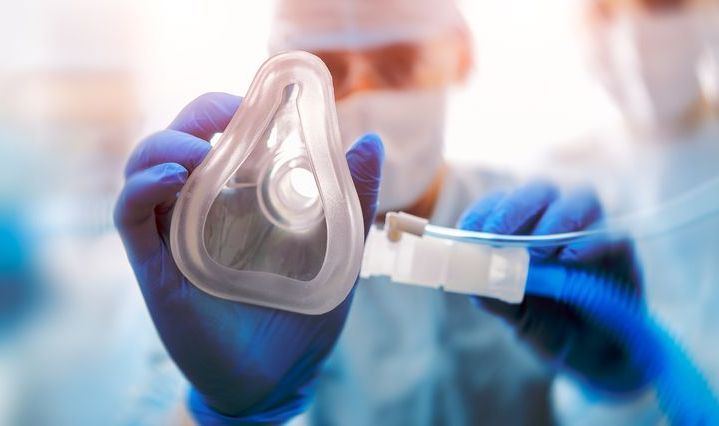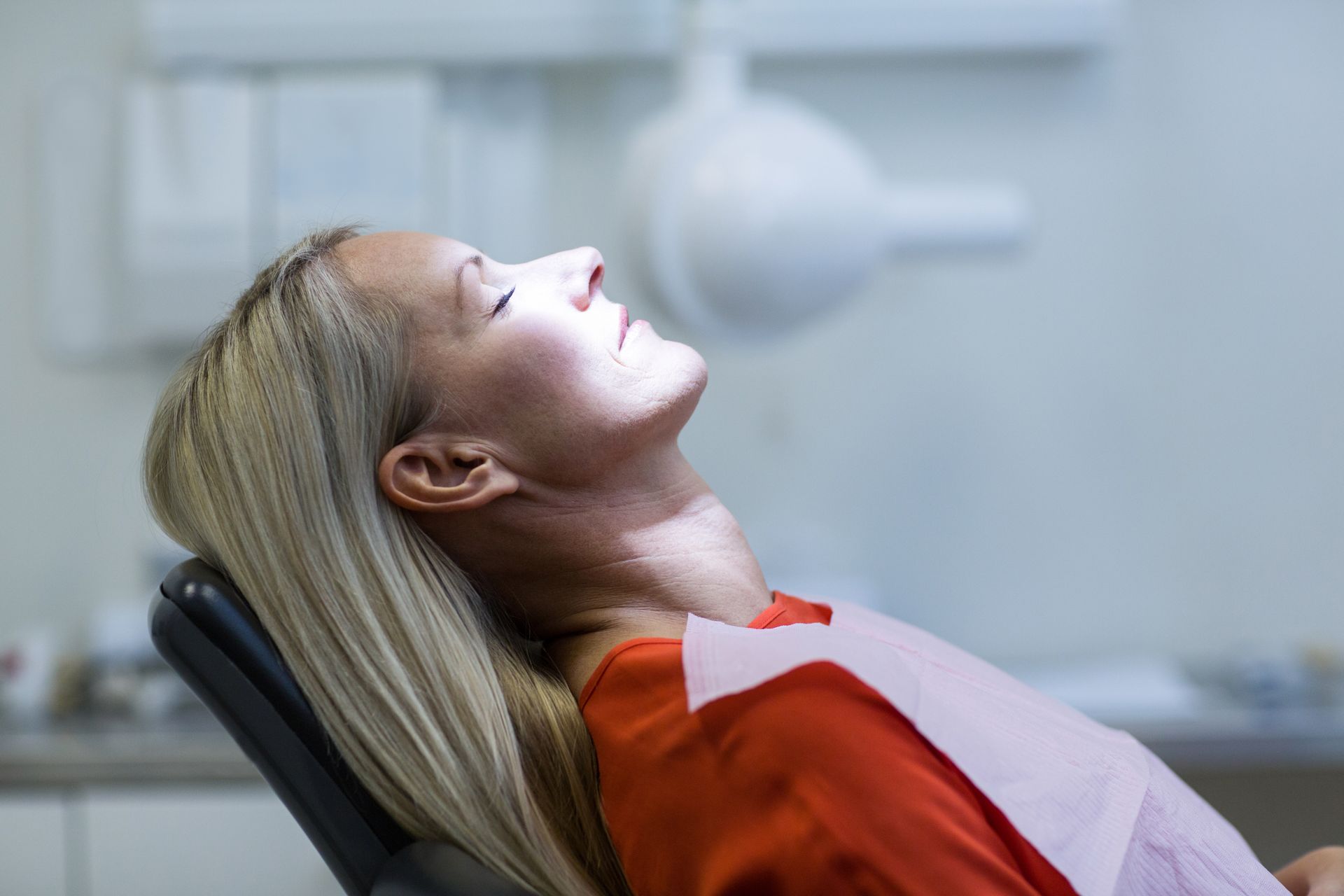General Anesthesia
General Anesthesia
General Anesthesia in Dentistry at The Comfort Dentist, Chesapeake, VA
We understand that visiting the dentist can be a stressful experience for many people. That's why we prioritize your comfort above all else at The Comfort Dentist. Regardless of your procedure, Dr. Kandare and our Chesapeake team want to ensure that your visit is as comfortable and anxiety-free as possible. We even offer general anesthesia in some instances or for specific patients who need help to ease any fear.
What is General Anesthesia?
General anesthesia is a type of sedation that places you in a deep sleep-like state. During this time, you will be completely unconscious and feel no pain or discomfort. Unlike local or conscious sedation, which reduces pain and anxiety while keeping you awake, general anesthesia provides a deeper level of sedation.
This state of controlled unconsciousness is administered by a trained professional who will closely monitor your vital signs throughout the procedure. This ensures your safety while allowing for effective and comfortable dental work.

Benefits of General Anesthesia For Dental Care
The use of general anesthesia offers several advantages in dental care:
- Pain and Discomfort Elimination: You will not feel any pain or discomfort during your dental procedure with general anesthesia.
- Anxiety Reduction: If dental procedures cause you anxiety or fear, general anesthesia can help by placing you in a state of deep relaxation.
- Efficiency: General anesthesia allows the dentist to work without interruption for complex or multiple procedures, potentially reducing the number of required visits.
What's It Like Being Under General Anesthesia?
While each patient's experience with general anesthesia may vary, most people report no awareness or memory of the procedure. You'll fall asleep quickly after the anesthesia is administered and wake up once it has worn off.
Upon waking, it's normal to feel a bit groggy or disoriented, but these feelings typically dissipate within a few hours. Remember, you'll need someone to drive you home after the procedure, as it can take some time for the effects of the anesthesia to wear off fully.

What is General Anesthesia?

General anesthesia is a type of sedation that places you in a deep sleep-like state. During this time, you will be completely unconscious and feel no pain or discomfort. Unlike local or conscious sedation, which reduces pain and anxiety while keeping you awake, general anesthesia provides a deeper level of sedation.
This state of controlled unconsciousness is administered by a trained professional who will closely monitor your vital signs throughout the procedure. This ensures your safety while allowing for effective and comfortable dental work.
What Dental Procedures Need General Anesthesia?
While many dental procedures can be performed with local anesthesia or conscious sedation, there are situations where general anesthesia may be necessary:
-
Complex Surgical Procedures
General anesthesia can ensure maximum comfort for complex surgeries like wisdom tooth extraction or dental implants.
-
Lengthy Procedures
If a dental procedure is expected to take several hours, general anesthesia can help make the process more comfortable.
-
Severe Dental Anxiety or Phobia
For patients who experience severe anxiety or fear about dental work, general anesthesia can provide a stress-free experience.
-
Special Needs
Certain patients may benefit from general anesthesia for specific medical conditions or special needs.
Remember, each patient's needs are unique. Dr. Kandare will discuss all available options to determine the most suitable approach for your care.
Risks of General Anesthesia
While general anesthesia is generally safe and effective, it's important to be aware of potential risks and side effects, as with any medical procedure. The risk can depend on several factors, including your general health, age, and the specific procedure. Some possible risks of general anesthesia may include:
- Nausea and Vomiting:
Some people may experience nausea or vomiting after waking up from general anesthesia. This is usually temporary and can be managed with medication.
- Drowsiness and Fatigue: It's common to feel tired or drowsy for several hours or even a few days after the procedure.
- Dry Mouth or Sore Throat:
The tube used to help you breathe during anesthesia can sometimes cause a sore throat or dry mouth afterward. This is typically temporary and eases within a few days.
- Allergic Reactions:
In rare cases, patients may have an allergic reaction to the anesthetic. Symptoms could include hives, swelling, or difficulty breathing.
- Postoperative Cognitive Dysfunction (POCD):
Very rarely, some people may experience confusion, memory loss, or difficulty concentrating after surgery. This is more common in older adults and is usually temporary.
Our anesthesiologist at The Comfort Dentist will discuss these potential risks with you in detail, considering your medical history and existing conditions. We will always prioritize your safety and comfort when considering general anesthesia.
Benefits of General Anesthesia For Dental Care
The use of general anesthesia offers several advantages in dental care:
- Pain and Discomfort Elimination: You will not feel any pain or discomfort during your dental procedure with general anesthesia.
- Anxiety Reduction: If dental procedures cause you anxiety or fear, general anesthesia can help by placing you in a state of deep relaxation.
- Efficiency: General anesthesia allows the dentist to work without interruption for complex or multiple procedures, potentially reducing the number of required visits.
What's It Like Being Under General Anesthesia?

While each patient's experience with general anesthesia may vary, most people report no awareness or memory of the procedure. You'll fall asleep quickly after the anesthesia is administered and wake up once it has worn off.
Upon waking, it's normal to feel a bit groggy or disoriented, but these feelings typically dissipate within a few hours. Remember, you'll need someone to drive you home after the procedure, as it can take some time for the effects of the anesthesia to wear off fully.
What Dental Procedures Need General Anesthesia?
While many dental procedures can be performed with local anesthesia or conscious sedation, there are situations where general anesthesia may be necessary:
-
Complex Surgical Procedures
General anesthesia can ensure maximum comfort for complex surgeries like wisdom tooth extraction or dental implants.
-
Lengthy Procedures
If a dental procedure is expected to take several hours, general anesthesia can help make the process more comfortable.
-
Severe Dental Anxiety or Phobia
For patients who experience severe anxiety or fear about dental work, general anesthesia can provide a stress-free experience.
-
Special Needs
Certain patients may benefit from general anesthesia for specific medical conditions or special needs.
Remember, each patient's needs are unique. Dr. Kandare will discuss all available options to determine the most suitable approach for your care.
Risks of General Anesthesia
While general anesthesia is generally safe and effective, it's important to be aware of potential risks and side effects, as with any medical procedure. The risk can depend on several factors, including your general health, age, and the specific procedure. Some possible risks of general anesthesia may include:
- Nausea and Vomiting: Some people may experience nausea or vomiting after waking up from general anesthesia. This is usually temporary and can be managed with medication.
- Drowsiness and Fatigue: It's common to feel tired or drowsy for several hours or even a few days after the procedure.
- Dry Mouth or Sore Throat: The tube used to help you breathe during anesthesia can sometimes cause a sore throat or dry mouth afterward. This is typically temporary and eases within a few days.
- Allergic Reactions: In rare cases, patients may have an allergic reaction to the anesthetic. Symptoms could include hives, swelling, or difficulty breathing.
- Postoperative Cognitive Dysfunction (POCD): Very rarely, some people may experience confusion, memory loss, or difficulty concentrating after surgery. This is more common in older adults and is usually temporary.
Our anesthesiologist at The Comfort Dentist will discuss these potential risks with you in detail, considering your medical history and existing conditions. We will always prioritize your safety and comfort when considering general anesthesia.
Reserve Your Appointment Today!
At The Comfort Dentist, our goal is to make your dental experience incredibly comfortable and stress-free. If you need a dental procedure and think general anesthesia could help you, please reach out to us.
Reserve your appointment today and let us take care of your dental needs.
Contact Us
2538 Centerville Tpke S, Chesapeake, VA 23322, United States of America
Hours
- Monday
- -
- Tue - Thu
- -
- Fri - Sun
- Closed
All Rights Reserved | Dentist Websites by Energize Group

